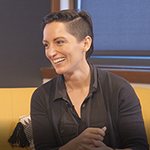Nonprofit Coffee Break: Tricia Rojo Bushnell

In the Nonprofit Coffee Break video series, Nonprofit Connect CEO Luann Feehan sits down with a different nonprofit leader each month to chat about leadership, learning, and life over a cup of coffee. Tune in to each episode to learn from these leaders' experiences and challenges and help us highlight our sector as an important and vibrant part of our city.
Nonprofit Coffee Break is presented by FROST Media Group.
This month, we sit down with Tricia Rojo Bushnell, Executive Director of Midwest Innocence Project.
In one sentence, please describe who you are what you do.
I am the director and a lawyer with the Midwest Innocence Project, which represents people convicted of crimes they did not commit and works to change the system that convicted them.
How did you get started working in the nonprofit sector?
I had always volunteered and been involved with organizations doing social justice work, both growing up and during higher ed, so the idea of working at a non-profit wasn't foreign to me. That didn't mean it was my first choice. As a Latina and the first person in my family to go to college, I felt a lot of responsibility to be financially secure enough to provide for my family and my community. And when I graduated law school, I went to a big firm in the private sector. But that didn't last long. While I was there, I realized that not only did the work not bring me joy, I really wanted to be doing meaningful work, work that challenges the systems that create inequity. My firm had let me bring a pro bono client with me when I started -- a client whose case I had worked on in law school. The client had been sentenced to death and was innocent. I soon realized that working for him was all I wanted to spend my time on. So I left the firm and went to my first full-time non-profit job as a Fellow with the Equal Justice Initiative of Alabama. There, we represented folks sentenced to death, people who had been sentenced to die in prison for things that occurred when they were children, and sex offenders challenging the laws that limited their ability to even exist. It was there that I really had to examine what the various levels non-profits work on are -- the differences between just providing services and providing services while seeking to make your own organization obsolete.
On what day did you feel proudest of your work?
There are two days, really. One is when we passed a bill to provide compensation for individuals who were exonerated in Kansas, to provide some sort of recognition of the harm we as a society have done to the wrongfully convicted and their loved ones, a recognition that we owe them and need to make amends, and to begin to try and give them some way to start again. What made me so proud was that, in a time when many legislatures are trying to cut funding to things, Kansans came together as a community to say that the budget didn't matter - this was the right thing to do. To have an entire state come together unequivocally and say we must make this right. That was powerful and I was really proud to be a part of that.
The second day was actually a day when one of our clients was released and I couldn't be there. Each time someone you care about comes home, it marks you. It's unforgettable. But it's also a lot of work. To make sure folks have somewhere safe to go, to adjust to a new world so quickly after so long, to keep cameras out of their faces, get them something to wear, something to eat. It's overwhelming for everyone. I was devastated that I couldn't be there. But, unsurprisingly, I wasn't needed. And I was really proud of that--of the incredible team I get to work with. I know that no matter what, the organization will continue and this amazing group of people will be singularly focused on continuing the push for justice. I am really proud of them and us for that.
What is the biggest challenge you face in your role?
I want to say funding (is it ever not funding?), but honestly, I think it's getting people to feel like they can make a difference, that they can dent this system and that we can change reality if we all work on it together. The problems we all work on are so big. How do you wake up and think, we're going to change the criminal justice system, and then, not only get people to believe you, but join you and throw in their support? It's hard. It requires us to challenge our own preconceptions. It requires us to listen to voices the system devalues. And most of all, it requires us to believe in our own power in the face of people who will tell us we have none. I don't believe that and convincing folks of that is a challenge.
What is a trend you see in the nonprofit community that excites you, or worries you, and why?
Something that worries me in the non-profit field is this idea that non-profits are above or immune to the systems that create the very inequalities we seek to fix. That we ourselves are immune to things like implicit bias or that our work is inherently good because we mean to do good. As non-profits, we aim to better the world, to help our communities. Part of that is providing services for folks who need them right now, whether that be legal services or warm clothing or learning to read; if non-profits didn't help, more people would suffer. But if we really want to better the world, we have to understand that we also need to be building power, not for ourselves, but for the communities we serve, and that we need to be using our power to challenge the very structures and systems that allow people to be wrongfully convicted, to go hungry, to be homeless.
That means we need to be examining equity in our own organizations. Who has a seat at the table? Who are the decision makers? Who has the power? What do they look like and where did the come from? Is the staff and board representative of those you serve? Is it building power for them? If not, then it's lovely that we are providing services, but we will never make ourselves obsolete. And that is the real goal.
What is your advice for a new nonprofit professional?
You're going to mess up. A lot. And that's ok. Be open and honest and communicate communicate communicate. Be up front about your mistakes, own them, but don't let them define you. And if you are working in a place where it's not safe to make a mistake, get out. We can't better the world if we live in fear.
What is your go-to drink after a board meeting?
Tea? I don't know. Something to slow me down after being energized. Honestly, I love spending time with our board. The board is a group of people who love your mission enough to not only spend their free time helping the organization, but also contribute their resources and their contacts. How awesome is that? That doesn't mean I love putting together board materials (does anyone love this???). But I try to remind myself that board meetings are a place where folks are coming together to do work for a cause they are passionate about and so I try to give them the fuel and tools to do that. Now, if we're talking end of year appeal time, give me a whiskey. Neat.
What is your call to action?
Make noise. Be bold. Dream big and speak up and speak out, even when it's not comfortable. Especially when it's not comfortable. Doing the right thing can be hard, but nothing and no one has ever changed from being comfortable. We grow from our discomfort. We change from our discomfort. We cleanse things through agitation. What could we accomplish if we did not get in our own way?
Connect with Tricia
- Learn more about the Midwest Innocence Project.
Nonprofit Coffee Break is presented by:

Stay Up to Date
Get Nonprofit Connect's new blog posts and latest insights in your inbox. Subscribe to The Link weekly email newsletter.

